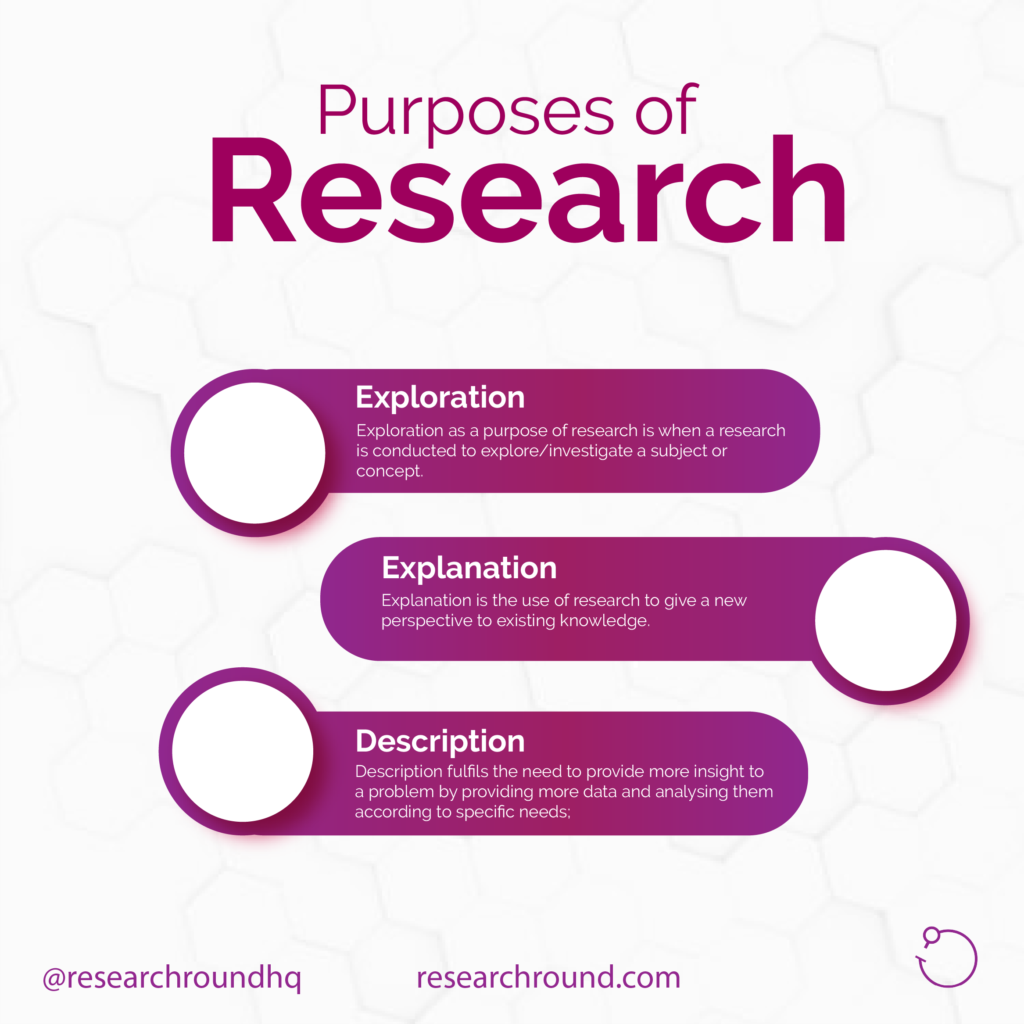What is Research?
Jonathan O’Donnell of the Faculty of Science, University of Melbourne, Australia, defined research on The Research Whisperer as “the creation of new knowledge and/or the use of existing knowledge in a new and creative way so as to generate new concepts, methodologies and understandings”.
Research deals a lot with bringing previously unknown things into focus. The later part goes on to cater to the other arm of research which deals with the use of existing knowledge in ways that are novel and to bring about a new understanding of world phenomena.
The three most widely-accepted purposes of research are exploration, description and explanation.

1. Exploration as a purpose of research is when a research is conducted to explore/investigate a subject or concept;
2. Description fulfils the need to provide more insight to a problem by providing more data and analysing them according to specific needs,
3. Explanation is the use of research to give a new perspective to existing knowledge. This is the purpose of research most students are familiar with as it is the form most undergraduate papers come in.
Six (6) other purposes of research?
The need to carry out researches is borne out of the necessity to understand phenomena in the world. It is through research that psychologists have refined the Freudian theory providing answers to how the behaviours of people stem from suppressed memories of their childhood. Various life hacks also own their roots to researches carried out by people including how short breaks in between reading sessions can increase the brain function.
1. In most topics dealing with research, the word research is mostly accompanied by another word; development, which is the reason companies have teams/units/departments named Research and Development. The interconnectivity between research and development almost literally translates to knowledge and growth. Thus, apart from the fundamental purposes of research which are exploration, description and explanation, here are some other purposes of research to prompt you into carrying out one yourself:
2. Research brings to light knowledge previously unknown or uncharted: Terry Freedman noted in his book “The Importance of Research for ICT Teachers” that “Research can shed light on issues we did not even know existed and can raise questions we hadn’t realised even needed asking”.
3. Researches in the social sciences have provided insights to crevices of human lives such as providing explanations for people’s political inclinations, exploring the nuances of social ethics in different societies, describing the impact of familial bonding on the psychological wellbeing of a person, among other previously unfamiliar issues.
4. Fact-check: In the age where the internet has made information accessible to everyone with a few clicks, news travel faster than was believed to be possible some decades ago. The speed at which information spread has birthed the need to fact-check news and information that find their ways to the public domain. Researching is the way some journalists go about fact-checking information before they release them to the public. Organisations and websites now exist with their mission being to check the factuality of news and information.
5. Research pushes the boundaries of knowledge: Research provides new perspectives to old issues and brings to light various new problems with a view to providing explanations or solutions to them. Man’s insatiable thirst for knowledge will continue to lead to more understanding of human existence including areas supposedly above the intelligence of man. Research has helped philosophers question almost everything related to human existence and knowledge while psychologists continue to provide explanations for every variation of human behaviour.
6. To test the reliability of their claims and that of others: One of the most essential features of research is the ability to recreate the result by following the same processes. It is through this means that researchers test the stability as well as the reliability of their findings as well as that of other researchers. It follows the logic that if a research can be recreated, it must be transparent enough to ensure its reliability.
7. Finally, research is born out of the need to increase knowledge and improve the understanding of humans about things that affect us. Research makes itself a necessary endeavour to the existence of human beings as there is a need to provide explanations for things that happen around us, seek solutions to problems, provide cures to ailments and just to explain the reason for the existence of man.
Written by Aisha Yusuf for ResearchRound


